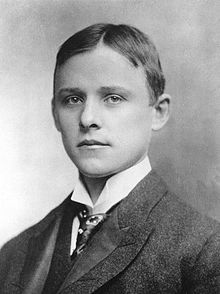
Back تشارلز هول Arabic تشارلز هول (كيميائى من امريكا) ARZ چارلز مارتین هال AZB Чарлс Мартин Хол Bulgarian Charles Martin Hall Catalan Charles Martin Hall German Charles Martin Hall Spanish چارلز مارتین هال Persian Charles Martin Hall French צ'ארלס מרטין הול HE
Charles Martin Hall | |
|---|---|
 Charles Martin Hall | |
| Born | December 6, 1863 Thompson, Ohio, US |
| Died | December 27, 1914 (aged 51) Daytona, Florida, US |
| Occupation | Engineer |
| Family | Julia Brainerd Hall (sister) |
| Engineering career | |
| Significant advance | Hall–Héroult process |
| Awards | Perkin Medal (1911) |
Charles Martin Hall (December 6, 1863 – December 27, 1914) was an American inventor, businessman, and chemist. He is best known for his invention in 1886 of an inexpensive method for producing aluminum, which became the first metal to attain widespread use since the prehistoric discovery of iron. He was one of the founders of Alcoa,[1][2] along with Alfred E. Hunt; Hunt's partner at the Pittsburgh Testing Laboratory, George Hubbard Clapp; Hunt's chief chemist, W. S. Sample; Howard Lash, head of the Carbon Steel Company; Millard Hunsiker, sales manager for the Carbon Steel Company; and Robert Scott, a mill superintendent for the Carnegie Steel Company. Together they raised $20,000 to launch the Pittsburgh Reduction Company, which was later renamed Aluminum Company of America and then shortened to Alcoa.